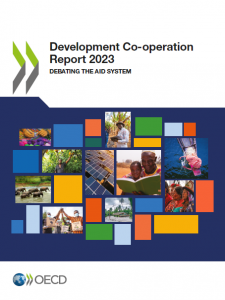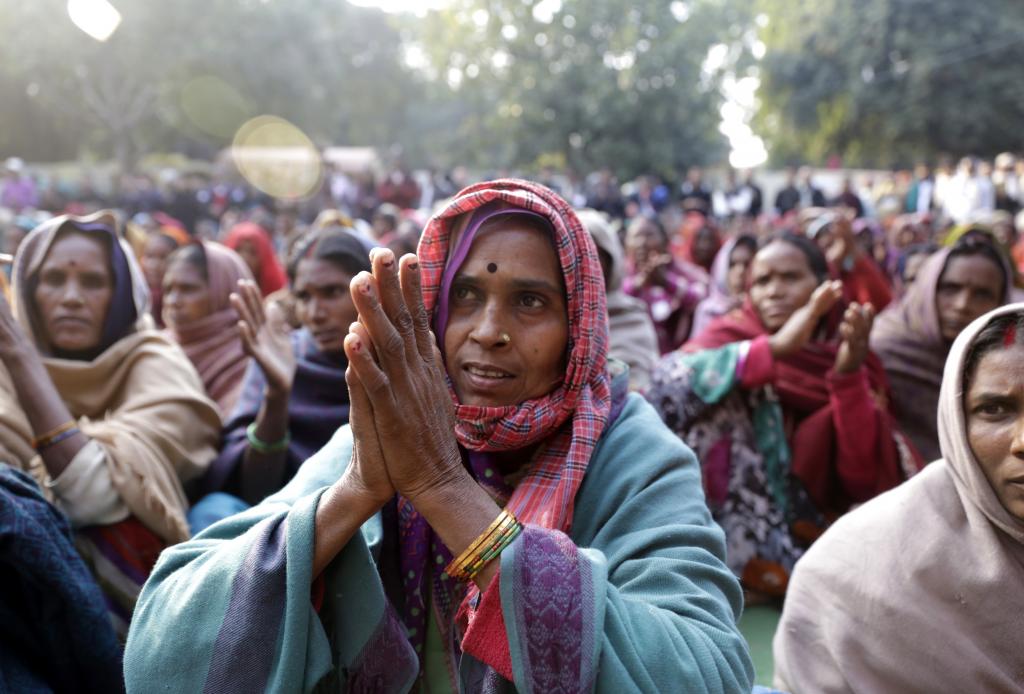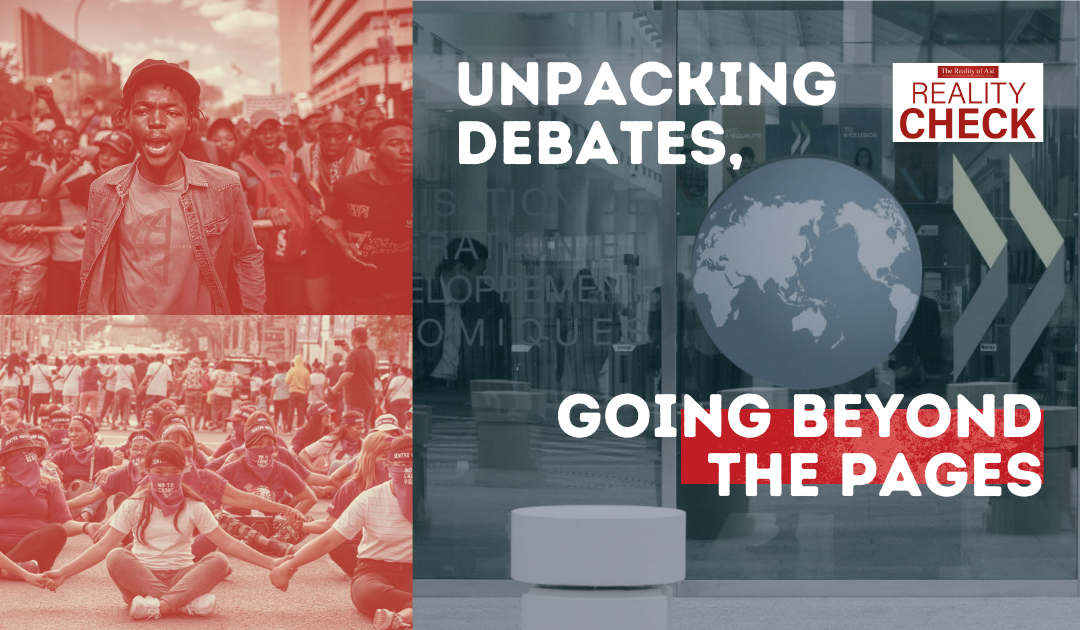- The release of the OECD-DAC’s (Development Assistance Committee) Development Cooperation Report 2023 (DCR 2023) posed vital debates on the aid system which are relevant to progress towards improving the current architecture.
- The Report highlighted important discussions on localization, power imbalances, and refinement of funding mechanisms to support the advancement of marginalized communities. The DAC recognizes that more work needs to be done to deliver the 0.7% (GNI) ODA commitment of donor countries and for development cooperation to be truly impactful down to the national and local levels.
- However, other critical debates continue to be blindsided by the DAC. These include the need for new and additional climate finance, the contentious role of the private sector in delivering aid, and the necessity to talk about aid conditionalities rooted on long-standing geopolitical and economic interests of donor countries.
- The debates found in the Report, as well as those which could have been included must inform the DAC’s agenda for change. While dialogues are important, these must not merely sit on the table but rather, be translated into concrete actions that will address crippling global challenges.
- Despite the many crises we are facing right now, these offer opportunities for continuous improvement in the aid system. Issues around aid and development cooperation are openings for donor countries, development actors, CSOs, and people’s organizations to open their arms for more quality engagements and partnerships that will benefit the global South.
The war in Ukraine, the coup in Myanmar, and the worsening climate crisis around the globe.
These are just some of the grueling events and phenomena of 2022 which hampered socioeconomic growth and have contributed to the aggravation of human rights violations in many countries, especially in the global South. Despite committing to countless development cooperation frameworks and declarations, the fracture between mere words and concrete actions was even more exposed due to COVID-19.
Through the release of the OECD Development Assistance Committee’s (DAC) Development Cooperation Report 2023 (DCR 2023), with its call for debates of the future of development cooperation, civil society, local organizations, and development actors are given a wide array of vital perspectives that are needed to push for better and effective delivery of aid and development cooperation.
Zooming into the Development Cooperation Report 2023

Development Cooperation Report 2023 cover
The DCR 2023 illustrates several debates around the aid system which try to uncover both gaps and successes in delivering aid to the most marginalized. The report was transparent in its assertion that the current state of development cooperation is not meeting the scale needed to respond to global crises. It highlights how several donor countries have persistently cut their aid budgets in the last year. Despite the historical commitment among donors to allocate 0.7% of their gross national income (GNI) to official development assistance (ODA), only five countries were able to achieve this goal, according to the final ODA figures for 2021. The entire picture also shows that the total contribution of DAC countries is merely 0.3% of their overall GNI, which has been the case since 2005. This in itself paints a grim image of how development cooperation is far from sufficient in addressing expanding challenges experienced by the disenfranchised in the global South.
In addition to deliberate slashes in budget, social pressures in the form of international crises such as wars, influx of refugees in certain countries, the climate crisis, economic recessions, and many others, also contribute to the thinning of ODA allocations. The necessity to quickly respond to these immediate challenges significantly shifts resources away from quality development cooperation and from fulfilling the commitment to effectiveness.
DCR 2023 acknowledges that more work needs to be done to bridge the gaps between what donor countries are saying and how aid is actually trickling down to the grassroots level. The DAC’s DCR 2023 is remarkable in unpacking several relevant issues that need to be addressed. These range from having an understanding that blended finance is also not delivering well to achieve the SDGs, to conceding to the reality that the “Leave No One Behind” principle is not being fulfilled because most bilateral ODA are more focused on middle-income countries, among others.
In spite of the negative trends molding the state of ODA and development cooperation arena, it is important to acknowledge that the DAC is open to new ways of working and of assessing their members in effectively delivering aid and fostering development cooperation between donors and partner countries.
Starkly evident in the Report is their focus on strengthening the localization agenda and alleviating power imbalances in development cooperation. Inside the Report’s pages, perspectives from global South and North organizations highlighted the importance of elevating attention to community consultations and use of local knowledge and practices to make aid more effective. There is a mutual understanding that locally-led transformation is a major impetus to improve the application of development cooperation down to the national and local levels.
DCR 2023 also stepped up its discussion on localizing aid initiatives by accepting the reality that racism is still a large part of delivering aid. Underscoring this truth is a stepping stone in going beyond colonial legacies tied to aid. At the same time, tackling and understanding the negative impacts of colonization and neo-colonial tendencies opens up more opportunities for OECD-DAC member countries, and even global South nations, to mutually transform existing power relations into something that will facilitate the amplification of marginalized peoples’ perspectives and lived realities in relations to aid and development cooperation.
It is good to note as well that a part of the localization debate in the Report tackles not only the relevance of localization practices, but also the cruciality of increasing direct funding to local organizations. In line with this, international NGOs (INGOs) are being proactive in changing the narrative towards shifting the power for greater local leadership in the global South by diversifying their mechanisms to cater to the contextualized needs, demands, and nuanced experiences of global South peoples.
Conversations around refining the flow, quantity, and quality of funding was also highlighted in the DCR 2023. Various points of view on streamlining policies related to financing were showcased, and how these are relevant to crafting long-term national development interests. It is commendable on the part of the DAC to include such discussions as these connect with the reiteration of calls for donor countries to fulfill commitments that have been hanging in the air for decades now. It is crucial that the DAC brings these challenges and debates on the future of development cooperation in this DCR to motivate engagements with key stakeholders in both their donor member countries and in partner countries in the global south.
Transformation beyond words on paper
 With the acknowledgement that the DC3 2023 brewed diverse conversations that can guide the direction of aid and development cooperation in the near future, it is also salient to articulate matters which could have been discussed more in the Report.
With the acknowledgement that the DC3 2023 brewed diverse conversations that can guide the direction of aid and development cooperation in the near future, it is also salient to articulate matters which could have been discussed more in the Report.
Particularly, with the critical need to address the climate crisis, DCR 2023 should have allotted more space to discuss the necessity and challenges for new and additional climate finance. With the USD 100 billion commitment not being met, effective climate finance remains in limbo, which is further slowing down progress related to adaptation, mitigation, and loss and damage. Debates must be strengthened on how ODA and climate finance must work in synergy with each other, not becoming an “either/or” situation. Donors must heed the call for effective concessional adaptation, mitigation, and loss and damage finance to be additional to increasing ODA allocations for other purposes. The DAC mandate to align all development finance with the goals of the 2015 Paris Declaration on climate finance should not be an excuse to diminish the urgency of resources to achieve all the Sustainable Development Goals by 2030. ,
Debates on the role of donor countries’ political interests in shaping their development cooperation priorities should be escalated as well. With rising geopolitical tensions, funding mechanisms and modalities are impacted depending on the national interests of powerful nations. In ODI’s Principled Aid Index 2020, data shows that the decline in donors’ aid allocation to the global South is partly due to protectionist measures that ‘secure direct short-term commercial and geo-strategic benefits’. While it is important that the DCR articulates the importance of improving and democratizing financing so that it can facilitate national and local growth, there needs to be a deeper examination of how donors’ political and economic interests are tied with aid and how it is being delivered. The DAC is in the prime position to jumpstart these conversations to assure that ODA is maximized according to the needs and contexts of communities it must serve.
For instance, future debates should call for more political evidence-based discussions regarding the negative impacts of conditionalities anchored in aid loans and broader foreign policies, which only reinforce the imbalance in power relations between donor and recipient countries. Addressing and talking about unequal power relations must confront realities rooted ultimately in neoliberal frameworks. Donor countries and the OECD-DAC are yet to show the global South how much they are willing to include more conversations around critical areas that may be uncomfortable for them and their interests, but have deep-rooted consequences for global South peoples.
These political debates should also attempt to unpack the role of the private sector in delivering ODA. Their entry into the development cooperation arena calls for a strong discussion too, testing current assumptions about these roles, as it paints a picture that emphasizes the lack of public funding, undermining donors’ historical commitment to the global South, and only worsens aid conditionalities.
Beyond the Report’s findings, the question now is how to turn them into an agenda for change. For many years now, the OECD-DAC has been evidently lagging behind the mandate to turn policies into concrete drivers of change. In a recent meeting between the DAC-CSO Reference Group and some OECD-DAC officials, CSO members expressed the importance for the DCR 2023 to be used to motivate not just important debates, but also concrete actions to address critical issues on aid, development cooperation, and their effectiveness. Amid overwhelming global crises plaguing many societies nowadays, perspectives from the Report must be translated into donor actions and improved policies that will benefit recipient countries now more than ever.
Following through on the debates found in the Report involves practically addressing gaps in implementation. For example, on top of highlighting the need to prioritize localization practices and national partner country interests, another critical area of dialogue should tackle transparency mechanisms when it comes to reporting flows of funding. These were not substantially debated in the Report. Communities and CSOs must know, through accessible documents, where the money is going and how they are actually contributing to development cooperation and effectiveness.
Despite our many global challenges, this year’s Development Cooperation Report provides a silver lining towards continuous improvement in the aid system. Several crises may be upon us but similar to the sentiment informing the Report, these setbacks are also opportunities for donor countries, development actors, CSOs, and people’s organizations to open their arms for more quality engagements and partnerships in the service of Southern peoples. Moreover, sustained critiques of the aid system are needed now more than ever to aid in this progression towards a systemic transformation that will truly embrace the demands and stories of the marginalized.

